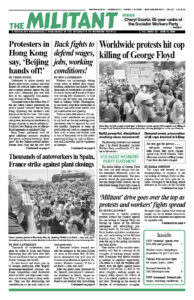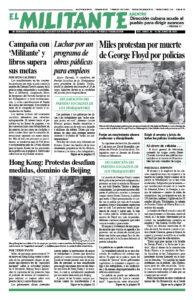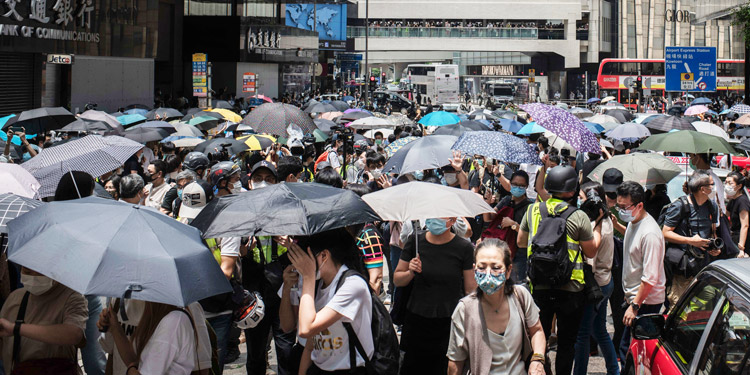Undeterred by police assaults and threats from bosses, workers and other fighters for political rights have continued to mount protests against the Chinese rulers’ deepening grip over their lives in the supposedly semi-autonomous territory of Hong Kong.
Thousands took to the streets May 27 the day before China’s parliament enacted a special “security” law on Hong Kong, bypassing that territory’s own legislature for the first time. The rulings criminalize “separatism, subversion of state power, terrorism or interference by foreign countries or outside influences.” It mirrors laws Beijing uses to stifle political opponents in mainland China.
Hong Kong’s parliament itself adopted additional measures attacking free speech, including outlawing “disrespect” for the Chinese national anthem. Retiree Rosa Ning told the New York Times that authorities insist on playing the anthem before public events like the operas she likes to attend, requiring people to stand up. “I stood up against my will,” said Ning, “but in my heart, I was singing ‘Glory to Hong Kong,’” — the anthem composed by the movement for political rights.
Over the past year millions of working people and youth joined demonstrations demanding direct elections for the city’s chief executive officer and its legislative council, currently selected by a Beijing-controlled committee, as well as for a halt to cop repression of their protests.
While the city’s main union group — the Hong Kong Federation of Trade Unions — is pro-Beijing, today’s mass movement for political rights and greater autonomy has helped spur the formation of new trade unions that are more independent.
Some workers in Hong Kong reported that their bosses threatened them to support Beijing against the growing pro-democracy movement. The Hong Kong Financial Industry Employees General Union, which represents bank workers, filed a complaint that Chinese bosses had pressured workers to sign a petition publicly supporting the new Chinese “security” law, and to send images of their signature out to others.
For decades the protest and commemoration of Beijing’s bloody suppression of the mass protest in Tiananmen Square on June 4, 1989, has been forbidden in China. The only exceptions have been in Hong Kong and Macau. But this year authorities also banned the event, claiming they are acting to prevent the spread of coronavirus. Some 180,000 people crowded into Hong Kong’s Victoria Park last year to mark the anniversary. Many joined that action to express their determination to halt Beijing’s interference there.
Washington, Beijing rifts sharpen
President Donald Trump used the Chinese government’s interference in Hong Kong to press the U.S. capitalist rulers’ interests in their conflicts with Beijing over trade and influence in Asia and elsewhere. These clashes — in the making for decades — follow Beijing’s rise as a major competitor to Washington. They have intensified with the current drop in world production and trade.
Trump announced May 29 that Washington will suspend preferential trading relations that give company bosses in Hong Kong tariff-free access to U.S. markets. It will also sanction some Hong Kong and Chinese officials. Chinese students and researchers with connections to Beijing’s military will be barred from entering the U.S., he said.
“Hong Kong is China’s Hong Kong,” haughtily replied Zhao Lijian, a spokesperson for the Chinese ministry of foreign affairs, warning Washington that Beijing would retaliate against U.S. companies in Hong Kong if Washington levies sanctions.
Millions of workers have moved from the Chinese mainland to Hong Kong since British colonial rule ended there in 1997. Many travel back and forth. Some participate in the movement for political rights in Hong Kong. The Chinese rulers remains not only fiercely determined to quash any resistance to their rule in Hong Kong, but to prevent it from spreading to mainland China.
When the Chinese government began lifting lockdown restrictions in March, workers in different parts of the country seized the opening to begin organizing, the China Labour Bulletin reports.
Construction workers recruited to build emergency hospitals from scratch in Wuhan, where the coronavirus outbreak began, protested to demand unpaid wages. In Liuzhou, 1,000 taxi drivers protested to demand the suspension of cab rental fees and the right to sell their vehicles back to the cab company they bought them from with no penalty.
The ban on public gatherings in Hong Kong was slated to end after June 4 — the anniversary of Tiananmen Square.


